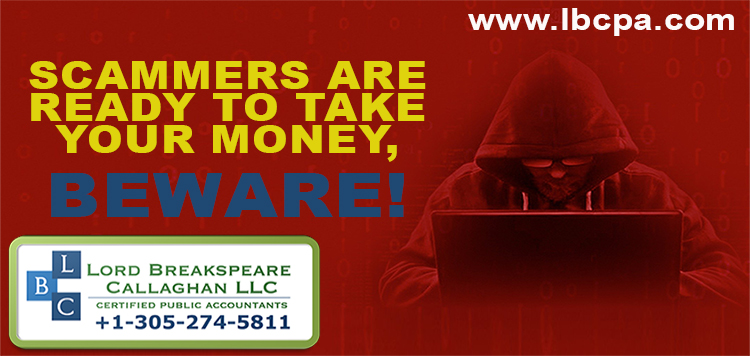LBCPA News 
Click here to go back
AVOID SCAMS OFFERING ECONOMIC IMPACT PAYMENTS

Scammers are counting on confusion about the Coronavirus Tax Relief offered to taxpayers who are impacted by the Coronavirus (COVID-19) and Economic Impact Payments (EIPs). Taxpayers should be aware of the numerous scams designed to steal their money and personal information.
The Internal Revenue Service (IRS) does not initiate contact with taxpayers to request any personal or financial information in order to receive an EIP through:
- Phone,
- Email,
- Text messages,
- Websites, or
- Social media sites, groups or forums.
Be cautious of anyone demanding money from you in order to receive an EIP. You don’t need to make a payment to receive an EIP.
Spread the word. Tell your friends, relatives and neighbors - do not to respond to any requests pretending to be associated with Coronavirus Tax Relief or EIPs.
FAKE WEBSITES
There are many scammers who use websites designed to look almost identical to a federal agency website, but they will not have the right URL or website address. Make sure you are looking at a website that starts with “https://” and ends with “.gov.” Otherwise they are likely not a valid U.S. government site. If you receive an email, text message, web link or other communication from an unknown source or sender, avoid clicking on the link or opening the attachments.
CHARITABLE DONATIONS
If you choose to donate to a charitable organization, use the IRS Tax Exempt Organization search tool to verify an organization’s federal tax status before donating.
REPORT SCAMS
IRS Coronavirus-related (COVID-19) scams should be reported to the National Center for Disaster Fraud (NCDF) Hotline at 866-720-5721 or submitted through the NCDF web Complaint Form. The NCDF is a national coordinating agency within the Department of Justice’s Criminal Division dedicated to improving the detection, prevention, investigation, and prosecution of criminal conduct related to natural and man-made disasters and other emergencies, such as COVID-19. Hotline staff will obtain information regarding your complaint, which will then be reviewed by law enforcement officials.
Fraud or theft of EIPs can also be reported online to the Treasury Inspector General for Tax Administration (TIGTA). TIGTA investigates external attempts to corruptly interfere with federal tax administration, including IRS-related Coronavirus scams.
Report unsolicited emails or social media attempts to gather information that appear to be from the IRS, the Taxpayer Advocate Service (TAS) or other government agencies by forwarding them to phishing@irs.gov. You should not engage potential scammers online or on the phone.
TAS ASSISTANCE
Know that TAS is assisting taxpayers who find themselves in hardship situations or dealing with IRS tax problems they’ve been unable to resolve directly with the IRS. Please understand though, that TAS is not able to respond to general inquiries about IRS EIPs. And for the time being, assistance provided by TAS is being provided to taxpayers virtually.
For questions about EIPs, please go to the www.irs.gov/eipfaq, call the EIP help line at 800-919-9835, or visit our TAS Coronavirus (COVID-19) Tax Relief site.
If you have any questions regarding accounting, domestic taxation, essential business accounting, international taxation, IRS representation, U.S. tax implications of Real Estate transactions or financial statements, please give us a call at 305-274-5811.
Source:TAS






